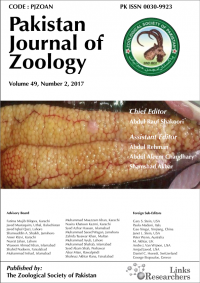1Department of Pathology, University of Veterinary and Animal Sciences, Lahore
2Livestock and Dairy Development Department, Government of the Punjab, Lahore
3Department of Microbiology, Quaid-e-Azam University, Islamabad
4Department of Pathobiology, Pir Mehr Ali Shah-Arid Agriculture University, Rawalpindi
ABSTRACT
Haemoparasites disturb camel production in tropical countries. Four major haemoparasites in camels are Trypanosoma, Dipetalonema, Babesia, and Anaplasma. The current study was executed to investigate haematobiochemical alterations in camels during haemoparasitism. Blood samples were collected from 200 camels of either sex and different ages from district Attock. Samples were processed for haematobiochemical analysis and thin smear stained with Field stain according to standard procedure. Out of 200 camels 46% of them have blood parasites. Trypanosoma was the most prevalent (32.5%) followed by diptelonemiasis (8%). Babesia and Anaplasma was seen in 3% camels. Prevalence of diptelonemiasis was significantly higher in young than older camels. Blood analysis revealed that blood parasites infection in camels results in decrease in PCV, Hb, RBC and PLT values and increase in TLC values. On the other hand, serum analysis revealed increase in ALT, AST, ALP and GGT while decrease in total protein and albumin (p>0.05).
To share on other social networks, click on any
share button. What are these?









